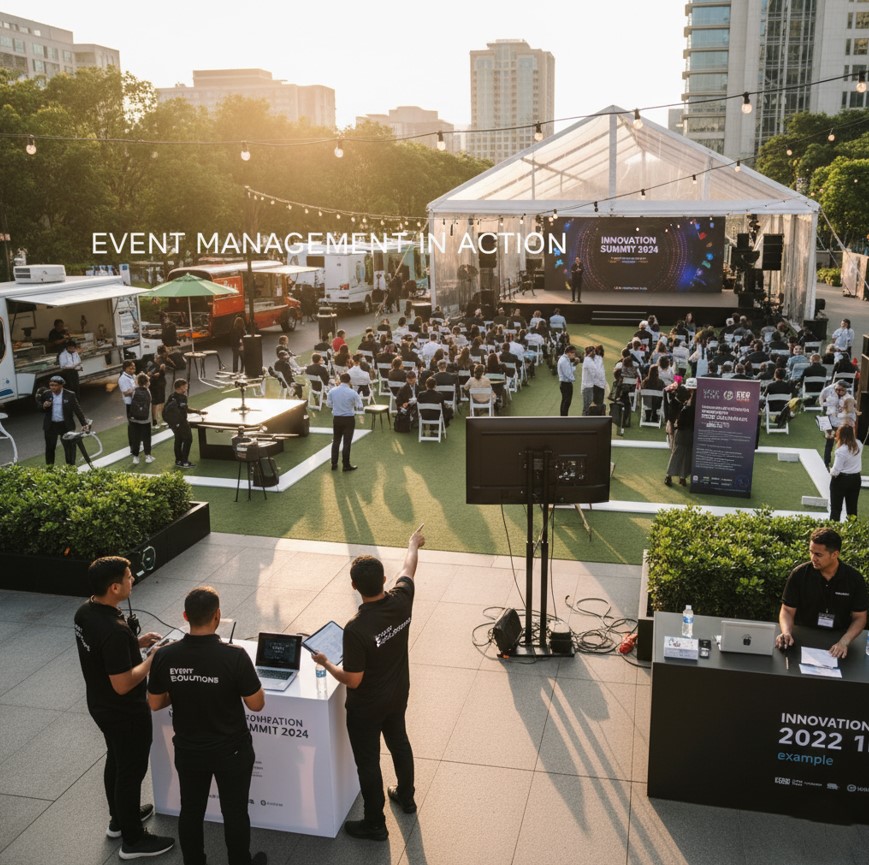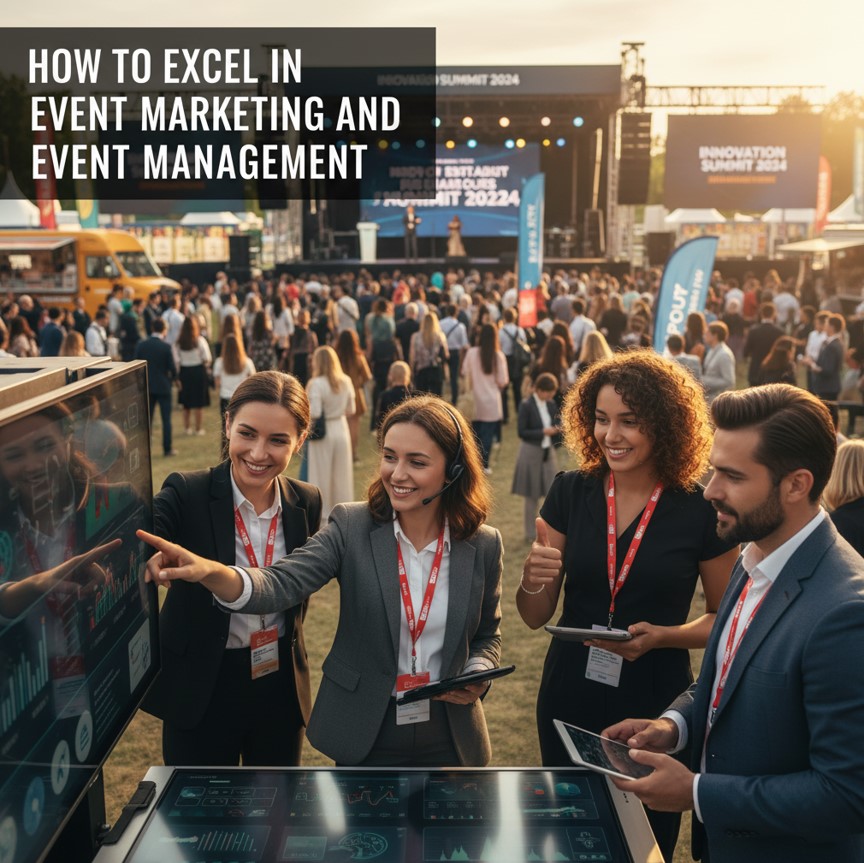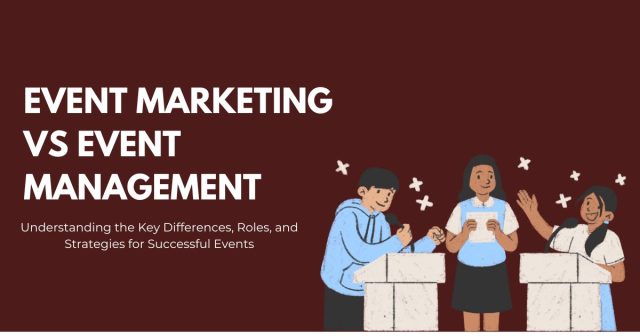If you’re confused about the difference between event marketing and event management, you are not alone!
Pulling off a successful event can seem like solving a huge puzzle with many moving parts. If you are new to the world of professional events, you may be curious about two major players in the industry: event marketing and event management. Are they the same thing? Do they overlap? And how do they intersect?
Anyone organizing a workshop, conference, trade show or even a product launch needs to know what is the difference between event marketing and event management. It is vital to comprehend the contrast that exists between them. This guide will delineate the distinctions, show how they play well with each other, and offer advice for becoming proficient in both.
Whether you’re planning your first event or finetuning your process as a seasoned producer, you’ll walk away with a solid understanding of how these individual activities fuel a robust event strategy.
What Is Event Marketing?

Event marketing is essentially promotion and engagement. It’s the act of generating excitement, gaining visibility for your event and encouraging people to come along. Event marketing is what you do to ensure that the right audience knows about your event, and is excited to attend.
Event Marketing Includes the Following Key Responsibilities:
- Determining the target demographic of the event, to avoid ineffective outreach.
- Developing a marketing plan (social media campaigns, email blasts, advertising, etc).
- Curation of branding and messaging to explain why the event is important.
- Providing a discount, freebie, or marketing hook.
- Monitoring sign-up and attendance numbers and analyzing them to measure how well marketing is working.
Event Marketing in Action Example
Event Marketing in Action Example
Think you’re running a tech conference for software developers. Your team promoting the event is working on things like:
- Running social media campaigns with click-worthy event-related hashtags
- Partnering with industry influencers to help spread the word about your event
- Creating engaging email campaigns that will push would-be attendees to register
They are the ones keeping seats filled — whether virtual or physical.
To boost visibility and engagement further, consider strategies from influencer marketing for event success — a growing trend in event promotion.
How Success is Measured
An evaluation of the effectiveness of event marketing often includes metrics like:
- Amount of registrations or sign ups
- Event awareness (advertising and social media engagement)
- Email or paid campaign CTR
- Monetary ROI on ticket or leads sold
Introduction: Without event marketing, your event has no bridge to its audience. Without it, even the best-run event is at risk of being forgotten.
What Is Event Management?
Event management, on the other hand, is about execution and logistics. Once guests are hooked, this is the squad that looks after them from start to finish. While event marketing dictates the “why” and “who,” event management focuses on the “how.”
Some of the Crucial Duties in Event Management Are:
- Scheduling the event timeline
- Reserving space, ordering food, hiring vendors
- Budget and contract management
- Handling logistics like seating, lighting, and parking
- Managing on-the-day operations to ensure smooth execution
For a deeper look into how modern tools can streamline this process, explore how event management software is transforming community events.
Some of the Crucial Duties in the Event Management Are:
- Scheduling the event timeline and schedule with others
- Reserving space, ordering food, hiring vendors and securing equipment
- Budget and vendor contract management
- Handling logistics, such as seating plans, sound and lighting installation and parking
- Managing on-the-day operations to make sure everything goes smoothly
Event Management in Action Example

For that same tech conference, your event management team would:
- Solidify venue bookings
- Organize catering and refreshments
- Ensure speakers have all their tech in order
- Keep a close eye on all real-time goings-on during the event
They’re the backroom troubleshooting problem solvers who adapt when new obstacles arise.
How Success is Measured
Success and failures in event management are based on qualitative metrics such as:
- Post-event surveys to help gauge customer satisfaction
- The plan is executed smoothly and within the planned time frame
- Staying within budget
- Happy attendees and sponsors
Where event marketing brings the people through the door, event management makes sure they leave happy.
Event Marketing vs Event Management: Major Differences
Here’s a quick easy guide to distinguish the two:
| Feature | Event Marketing | Event Management |
| Goal | Create buzz and draw people in | Host a perfectly planned and executed event |
| Focus | Promotion and engagement | Logistics and operations |
| Timeline | Pre-event (may carry on during event) | During-event or post-event |
| Key Metrics | Number of sign-ups, CTR, ROI | Guest satisfaction, events protocol |
| Responsibilities | Ads, collabs | Vendor securing, budgeting |
Both are equally critical. Ignoring one for the other would only make it more likely that an event is poorly executed or poorly attended.
How Event Marketing and Event Management Collaborate
Although they are separate, event marketing and event management are closely related and support each other. Here’s how they simplify your event into a single streamlined experience:
Collaboration from Day One
Effective event marketing starts with input from event planners or managers. For instance, ad campaigns can’t effectively promote an event if logistical information — like the location, date, speakers — isn’t nailed down.
Mutual Feedback Loops
Interest is monitored by marketing teams via registration data. This data is also used by event producers for very important planning details, such as venue or caterer capacity.
Managers similarly report logistics (e.g., sold-out seating sections) to marketing for promotional purposes.
On-the-Day Integration
The splashy giveaways or hashtags at the event? These ideas are generally generated by a marketing team and then implemented with the support, leadership and know-how of event management.
Post-Event Synergy
Post-event they will potentially have duties in common. For example, marketing aggregates successful campaigns, and event management responds to feedback on logistical aspects to enhance future events.
How to Excel in Event Marketing and Event Management

You don’t have to be an expert in both domains to run a good event, but integrating them is crucial. Here are tips for getting the two forces to work together:
Focus on Early Communication
Get marketing and management teams together in joint meetings right from the start. Clarity is needed for both sides to work to the same ends.
Invest in Event Tools
By using platforms such as Bizzabo or Eventbrite, both marketing and management tasks can be automated. These apps run the gamut from audience targeting to live information about event logistics.
Lean on Data
Leverage data gathered at every step (such as ticketing sales and on-site feedback) to guide both marketing efforts and the optimization of logistics.
Define Success Metrics
Get every team to agree what “success” would look like, whether that means a certain number of attendees or achieving a super-high satisfaction score.
Why You Need Them Both for Event Success
Ultimately, a great event is about the value it creates — for attendees, sponsors, and stakeholders alike. Event marketing brings the right people to the table, and event management makes sure the experience is flawless.
If you want to elevate your next event from good to exceptional, check out event marketing strategy: your complete guide to success to align both marketing and management under a single, winning plan.









